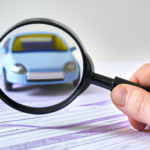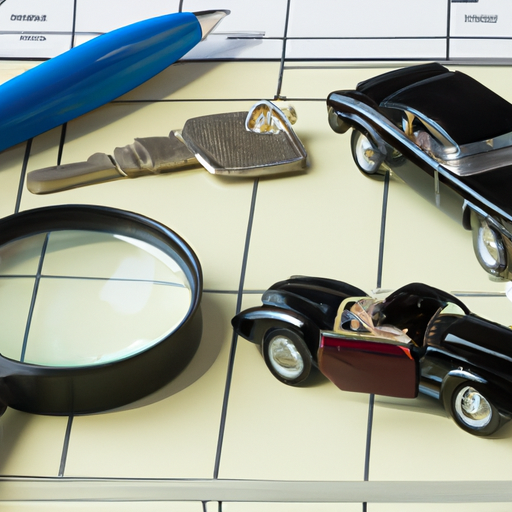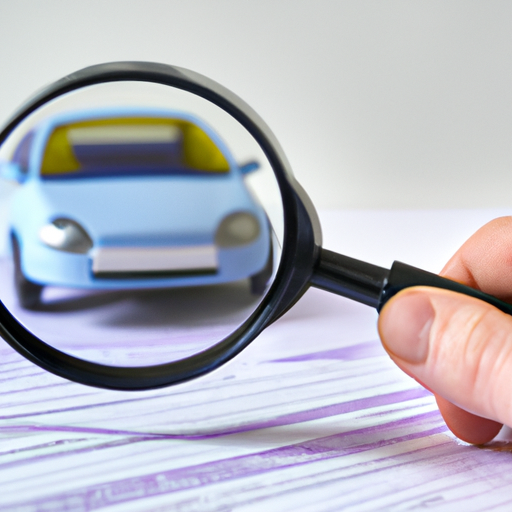Ever wondered how healthy your favourite ride has been over the years? “Guide to Checking Vehicle History Efficiently” offers you the perfect roadmap to get the scoop on your auto’s past. This useful guide offers you the ideal tips and clever insights about the best ways to check vehicle history. From exposing potential deal-breakers to helping you bargain better, you’ll discover this crucial part of car purchasing. Get ready to turn into an informed buyer after reading this savvy guide!
Understanding the Importance of Checking Vehicle History
Understanding the history of a vehicle is vital to making an informed decision when you’re considering buying a used car. Don’t settle for glances and sweet talks of the salesperson; your foremost duty is to delve into the vehicle’s past and ascertain its reliability.
Why you should check Vehicle History
By checking the vehicle’s history, you’ll get insights into the car’s past and assess its future performance. These reports reveal if the vehicle has been subjected to any severe accidents or if a significant repair work has been done. You’ll also learn whether the car has been used as a rental, been involved in a flood, or if it has a lien on it.
Risks associated with Not Checking Vehicle History
Taking a risk by not checking vehicle history could lead to regrettable consequences. You might end up with a vehicle that is unreliable, unsafe, or worth less than you paid. These could include severe accidents, serious mechanical problems, odometer fraud, and more.
Understanding Vehicle Title Statuses
Understanding a vehicle’s title status is part of knowing its history. Clean, salvage, rebuilt, junk, and lemon are some common statuses you might see. A clean title means the car has not experienced significant damage, whereas salvage and rebuilt titles often suggest the vehicle has been damaged and repaired.
Acquiring the Vehicle Identification Number (VIN)
A VIN, or Vehicle Identification Number, is your car’s unique identifier. It consists of 17 alphanumeric characters and is essential for checking a vehicle’s history.
Where to Find the VIN on Vehicles
You can typically find the VIN on a vehicle’s dashboard on the driver’s side, on the driver’s side door jamb, or, in some instances, in the engine compartment. It’s also listed on the car’s registration card and insurance documentation.
Understanding a VIN’s Structure
A VIN’s structure is complex but decipherable. Each digit or series of digits corresponds to specific information such as the vehicle’s make, model, year, engine size, and where it was built.
Mistakes to Avoid when Recording a VIN
While recording a VIN, ensure you copy it correctly, since a single typographical error can lead to erroneous vehicle information. Moreover, avoid relying solely on the paperwork for the VIN – verify it on the vehicle itself to evade any discrepancies.
Utilizing Free VIN Lookup Services
Free VIN lookup services can provide you with some basic information about a car’s history, though they may not be as comprehensive as paid services.
Benefits and Limitations of Free Lookup Services
While free services can provide basic information such as the make, model, and manufacturer, they may not provide detailed history reports. These reports often include information on any accidents, thefts, recalls, or service history.
Examples of Reliable Free VIN Lookup Services
There are quite a few reliable free VIN lookup services available to you. Some examples include the National Insurance Crime Bureau (NICB) and the National Highway Traffic Safety Administration (NHTSA).
How to Use a Free VIN Lookup Service
Using a free VIN lookup service generally involves inputting the VIN into the search bar on the website. The site will then return the basic information about the vehicle.
Deciphering VIN Decoder Results
Decoding a VIN can reveal important information about a vehicle’s history and present condition.
Understanding Manufacturer Identifying Numbers
The first few digits of a VIN represent the manufacturer identifying numbers. These can tell you the make, the country of origin and other key facts about the vehicle.
Reading Vehicle Attributes from VIN
Many vehicle attributes can be determined from a VIN, such as the model year, engine type, body style, and more. This information enables you to verify if the given attributes match those of the vehicle you are considering.
Identifying Vehicle History Information from VIN
While VINs are mainly used for identification purposes, they also provide access to vital information about a vehicle’s history – such as registration details, recorded accidents, title information, and more.
Using Paid Vehicle History Reports
While free lookups are useful for basic information, paid vehicle history reports can provide a much more comprehensive look into a vehicle’s past.
Justifying the Cost of a Paid Report
Although you will need to pay for these reports, the investment is often justified by the wealth of information they provide. They can literally save you thousands by helping you avoid problematic vehicles.
Benefits of Comprehensive Vehicle History Reports
Comprehensive vehicle history reports can provide insight into any title problems, service history, previous accidents, and more. These reports can also show if the odometer has been rolled back or if the vehicle was reported stolen.
Examples of Best Paid Vehicle History Report Services
Popular examples of paid vehicle history report services include CarFax and AutoCheck. These services provide detailed vehicle history reports that help you make informed decisions when purchasing a used car.
Reading and Interpreting Paid Vehicle History Reports
Vehicle history reports can be a goldmine of information if you know what you’re looking at.
Understanding the Accident History Section
The accident history section of the report reveals any recorded accidents in the car’s history. This can help you identify any potential damage or issues that might not be visible on the surface.
Deciphering the Title History
The title history provides you with the information regarding the past ownership and title transfers, revealing if the vehicle had ever been branded as salvage, rebuilt or damaged in any other way.
Reading the Service and Repair History
The service and repair history highlights the vehicle’s maintenance record, such as regular oil changes and repairs, so you can get a sense about how it’s been taken care of.
Interpreting the Ownership History
By interpreting the ownership history, you can determine how many people have owned the vehicle, how long they owned it and in some cases, how it was used, that fundamentally impacts the car’s overall condition.
Checking for Recalls and Safety Issues
Unattended recalls or safety-related defects can endanger your life and hit your pocket hard for repair costs.
Importance of Checking for Recalls and Safety Issues
Checking for recalls and safety issues is a critical step when considering a used car. A recall means that the manufacturer or the NHTSA has determined that there’s a safety-related defect with the vehicle.
How to Find Recall Information Using the VIN
NHTSA’s website allows you to enter the VIN to find out if there are any open recalls associated with the vehicle you’re considering.
What to do if your Vehicle has a Recall or Safety Issue
If the car you’re considering has a recall or safety issue, ensure the issue has been remedied before purchase or discuss this with the seller and negotiate the price accordingly.
Verifying the Vehicle’s Mileage
Verifying a vehicle’s mileage is an indispensable part of purchasing a used car.
Importance of Verifying Vehicle Mileage
The mileage can reveal a lot about a car’s condition and can offer hints about its past maintenance. A car with low mileage is likely to have less wear and tear compared to a high-mileage car of the same age.
How to Check the Odometer
To check the odometer, you need to compare the mileage on the odometer with the mileage stated in the vehicle’s service records and emission reports and look for any discrepancies.
Recognizing Signs of Odometer Fraud
Odometer fraud, where sellers turn back the odometer to increase the vehicle’s selling price, is more common than you might imagine. Signs could include uneven wear and tear relative to the claimed mileage or discrepancies within the vehicle’s service records.
Looking for Signs of Flood and Fire Damage
Identifying signs of flood and fire damage in a used vehicle is an essential part of the pre-purchase inspection.
Why you should Check for Flood and Fire Damage
Flood and fire damage can significantly affect a vehicle’s functionality and lifespan. For instance, flood water can short-circuit electrical components or cause rust, while fire can compromise integral structural components.
Signs of Flood Damage on a Vehicle
Signs of flood damage could include damp or musty odors inside the vehicle, discoloration on the seats or seatbelts, and signs of mud or silt in unusual places such as under the carpet or in the trunk.
Signs of Fire Damage on a Vehicle
Signs of fire damage may include discoloration of metals, burnt or melted components in the vehicle’s interior or engine components.
Taking Additional Precautionary Measures
Additional precautionary measures you must take are enlisting a professional mechanic for inspection, taking a test drive and utilizing an escrow service for payment.
Why you should get a Professional Mechanic Inspection
An expert mechanic’s inspection can reveal potential issues that you may have missed and help confirm your decision. They are trained to detect trouble areas and can provide an expert opinion on the car’s condition.
Importance of a Test Drive
The importance of a test drive cannot be overemphasized. It offers an opportunity to see how the car performs and handles on the road, as well as check the functionality of all the equipment in the car.
Using an Escrow Service for Payment
Finally, using an escrow service provides an additional layer of security during payment. The service holds your payment until you’ve received the car and confirmed that everything is satisfactory. It protects both the buyer and seller from fraud.
In conclusion, knowing the vehicle history is critical before purchasing a used car. The more informed you are about the vehicle’s past, the less likely you are to make a costly mistake. Always remember, a cheap deal upfront might end up being the costliest one in the long run.










